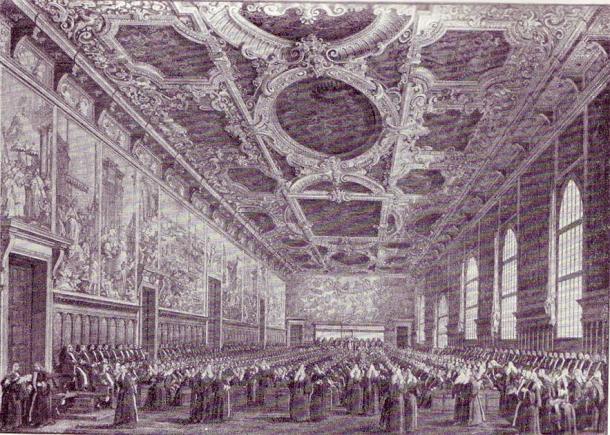A new anthropological study provides a strong message about what happens when social contracts are broken by a previously good government – the government and the society collapses – hard. Essentially the study finds, when a government is good, it’s very, very good, but when it goes bad, it’s the worst.
One of the most interesting aspects of the new study published in Frontiers in Political Science is that the researchers found that when “good” governments – which Field Museum describes as “ones that provided goods and services for their people and did not starkly concentrate wealth and power” fell apart, the fall was much more dramatic and intense than when dictatorships crumbled.
A Field Museum press release reports that anthropologists came to this conclusion after taking a broad, global sample of 30 pre-modern societies – including a generous mix of governments ruled by what they call “ruthless dictators” and “well-meaning representatives.”

A map of the 30 pre-modern states analyzed in the new study. (Blanton et al. 2020/ Frontiers in Political Science )
Four Historically “Good Governments” that Dramatically Collapsed
Their focus was on the governments of four ancient societies: the Roman Empire, China’s Ming Dynasty , India’s Mughal Empire , and the Venetian Republic . These four societies were deemed to have “good governments” overall because “they had comparatively more equitable distributions of power and wealth than many of the other cases examined,” according to the Field Museum.
Popular elections weren’t included as a factor in what makes good governance because, as Gary Feinman, the MacArthur curator of anthropology at Chicago’s Field Museum and one of the other authors of the new study, says:
“There were basically no electoral democracies before modern times, so if you want to compare good governance in the present with good governance in the past, you can’t really measure it by the role of elections, so important in contemporary democracies. You have to come up with some other yardsticks, and the core features of the good governance concept serve as a suitable measure of that.”

An engraving by Giambattista Brustolon showing the Great Council of Venice. ( Public Domain )
However, Feinman also notes that the so-called “good governments” all “had other checks and balances on the concentration of personal power and wealth by a few individuals. They all had means to enhance social well-being, provision goods and services beyond just a narrow few, and means for commoners to express their voices.”
The study results show a common thread in the collapse of the “good governments”: the leaders stopped following and encouraging significant societal principles, morals, and ideals. From there, people lost confidence in their government and things dramatically fell apart. Feinman points out , “Most societies have some kind of social contract, whether that’s written out or not, and if you have a leader who breaks those principles, then people lose trust, diminish their willingness to pay taxes , move away, or take other steps that undercut the fiscal health of the polity.”
A Good Government Gone Bad
An example of “a good government gone bad” is shown in the story of the Roman emperor Commodus. Granted, leadership wasn’t necessarily easy for him – he stepped into his role while ancient Rome was experiencing some economic and military instability – but he made bad choices that certainly didn’t help make anyone’s life easier. Instead of trying to bring some peace to the people of Rome, Commodus decided to play gladiator and act out his fantasy of being like Hercules. His bad choices led to his assassination and then the whole Roman empire fell into a period of worse corruption and crisis.

Bust of Roman emperor Commodus as Hercules. ( CC BY-SA 2.0 )
Although it may have been difficult, Commodus and leaders like him have had chances to try to make things better instead of worse. Richard Blanton, a professor emeritus of anthropology at Purdue University and the lead author of the new study, explained that things could have potentially gotten better if “the potential for failure caused by an internal factor” was “properly anticipated” and then managed. But he says, “an inexplicable failure of the principal leadership to uphold values and norms that had long guided the actions of previous leaders,” is more likely to be “followed by a subsequent loss of citizen confidence in the leadership and government and collapse.”
All Good Things Must Come to an End?
The anthropologists also found that societies practicing good governance generally lasted longer than the more autocratic counterparts, but it was much harder for the citizens of the formerly good governments to cope when things turned bad . This was generally because people had become reliant “on infrastructure of that government in their day-to-day life,” according to the Field Museum’s press release. As Feinman explains ,
“With good governance, you have infrastructures for communication and bureaucracies to collect taxes, sustain services, and distribute public goods. You have an economy that jointly sustains the people and funds the government. And so social networks and institutions become highly connected, economically, socially, and politically. Whereas if an autocratic regime collapses, you might see a different leader or you might see a different capital, but it doesn’t permeate all the way down into people’s lives, as such rulers generally monopolize resources and fund their regimes in ways less dependent on local production or broad-based taxation.”
History May Be Rhyming, Not Necessarily Repeating
What does all of this mean for us today?
Feinman provides us with the gentle reminder that, “Pre-modern states were not that different from modern ones. Some pre-modern states had good governance and weren’t that different from what we see in some democratic countries today.” Even while looking at democratic nations now, you will see that inequality is increasing, political power is being concentrated, taxes are being evaded, public services are declining, infrastructure is diminishing…things still aren’t perfect.
Blanton states that the study demonstrates “societies, even ones that are well governed, prosperous, and highly regarded by most citizens, are fragile human constructs that can fail.” We have to be thoughtful and cautious about our next steps. One way to do this is to look at the results of past choices. As Feinman notes, “History has a chance to tell us something. That doesn’t mean it’s going to repeat exactly, but it tends to rhyme. And so that means there are lessons in these situations.”
Top Image: The ruins of the Roman Forum, once the site of a democratic ‘good government’. Source: scaliger / Adobe Stock
Related posts:
Views: 0
 RSS Feed
RSS Feed















 October 18th, 2020
October 18th, 2020  Awake Goy
Awake Goy  Posted in
Posted in  Tags:
Tags: 
















